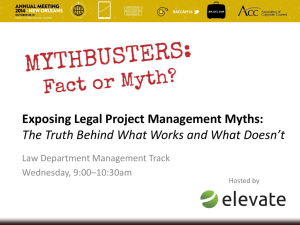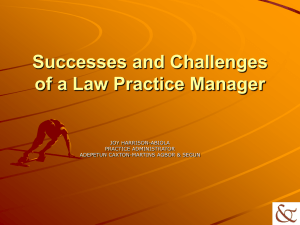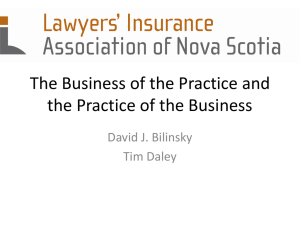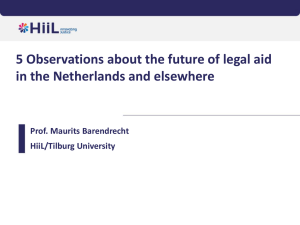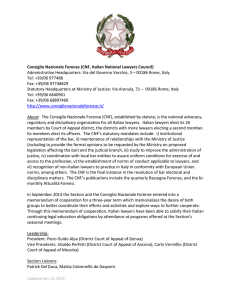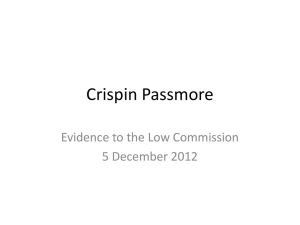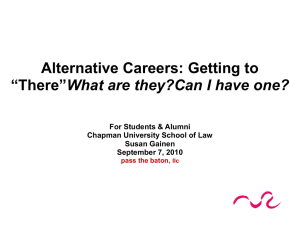Keynote speech of Judge Romeo T. Capulong
advertisement
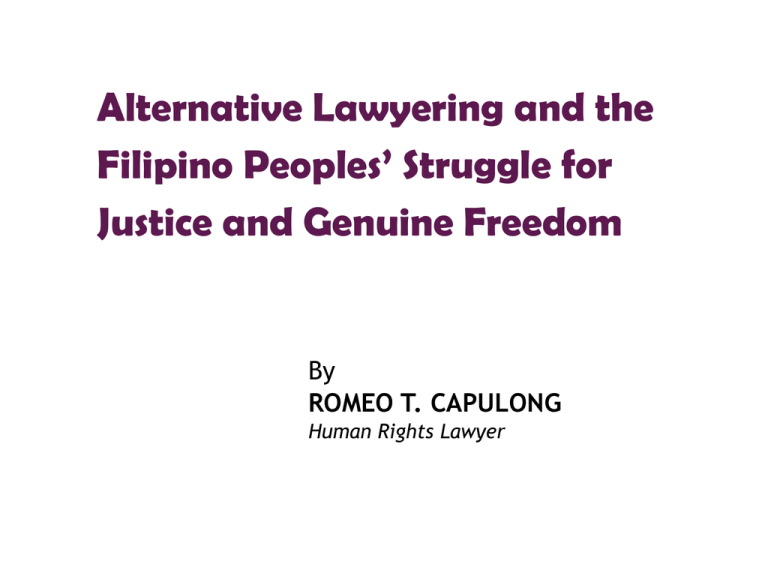
Alternative Lawyering and the Filipino Peoples’ Struggle for Justice and Genuine Freedom By ROMEO T. CAPULONG Human Rights Lawyer Lawyers perform a strategic role in shaping our national life. Rightly or wrongly, we are often perceived as leaders with the wisdom and capability not normally attributed to other professions. 9/25/10 Perhaps it is because of this perception and the preparation inherent in our craft that many lawyers occupy prominent positions in government politics, business, and many other fields of human endeavor. Lawyers play a significant role in political education and in promoting national as well as local issues that have a direct bearing on people’s livelihood, rights, and welfare. 9/25/10 Conversely, it is also true that in the public mind we are oftentimes stereotyped as shrewd, self-seeking, ambitious, opportunists, and protectors and advocates of the status quo, who are generally wanting in commitment to social change. 9/25/10 But the foregoing are the exceptions rather than the rule. Our historical experience has shown that lawyers, by nature, are sensitive to social and political conditions and especially to injustices and human rights violations. We generally respond to the challenge to contribute our skills in defending the poor and even serve and lead in the struggle for a just and humane society. At crucial junctures in our history, we produced passionately 9/25/10 In the Philippine context, lawyering for the poor means lawyering for peasants workers urban poor small fisherfolk indigenous women peoples and migrant workers who comprise the over whelming majority of 9/25/10 The Philippine legal system serves the poor in two ways. The first is through traditional legal aid or free legal assistance to indigent litigants, a practice introduced by our Spanish and American colonizers along with their legal systems. 9/25/10 The second is through human rights lawyering or public interest law practice. Sometimes it is also called alternative law practice, to distinguish it from traditional law practice. The late Philippine Senator and activist lawyer Jose W. Diokno called it developmental legal aid. 9/25/10 Whichever name is used, the fact remains that in addition to rendering competent and dedicated legal services, we are also committed to our clients’ aspirations for social change. 9/25/10 Public Interest Law Practice As Distinguished from Traditional Legal Aid Perhaps the best way to define public interest law practice and to distinguish it from traditional legal aid is to state its clientbeneficiaries, its mandate, the issues and causes involved, the tactics employed in handling cases, and the kind of commitment and discipline demanded of public interest or people’s lawyers. 9/25/10 Philippine society is highly stratified, with a tiny elite monopolizing political power and economic resources. We have a long history of anti-colonial and neocolonial struggles against foreign domination, particularly the United States, and the U.S.-controlled multinational corporations and multilateral institutions. Our economic, political, social and cultural life has been dominated by our elite and foreign masters. An overwhelming majority of our people remain poor and 9/25/10 The people’s lawyers emerged as a response to these social inequities, particularly human rights abuses, and to the aspirations of the poor for a just and humane society. The people’s lawyers derive their mandate from the poor people’s struggle for justice–not from the government, not from the law, and certainly not from selfish material agenda. 9/25/10 Our client-beneficiaries and the issues and causes we take up are the following: 9/25/10 Our client-beneficiaries and the issues and causes we take up are the following: The peasants in their struggle for genuine land reform and their legal battle against land-grabbing and eviction in the name of so-called development by land-grabbers masquerading as property developers. 9/25/10 The migrant workers in the defense of their human rights under national and international law in the host country and in their struggle against the apathy and callousness of their own government to their problems as migrant workers, and to the problems that beset their families in the homeland; 9/25/10 Our client-beneficiaries and the issues and causes we take up are the following: 9/25/10 The workers in their struggle for wages and working conditions and in their struggle to organize trade unions and associations that empower them and represent their genuine interests; 9/25/10 Our client-beneficiaries and the issues and causes we take up are the following: 9/25/10 The urban poor and informal settlers, oftentimes disparagingly called “squatters,” in the defense of their right against summary eviction and for adequate relocation sites, housing, and livelihood; 9/25/10 The small fisherfolk in their struggle to defend their fishing grounds against the intrusions of local and foreign fishing defend their fishing grounds against the intrusions of local and foreign fishing magnates; 9/25/10 The indigenous peoples in the defense of their ancestral domain against land-grabbers and local and foreign mining companies; 9/25/10 Political victims of violations of human, civil, and political rights such as extra-judicial killings, involuntary disappearances, torture, illegal arrests, and arbitrary detention committed by the state through its police, military, and paramilitary forces; 9/25/10 Our client-beneficiaries and the issues and causes we take up are the following: 9/25/10 Women in their struggle for equal rights and against all forms of violence against their persons and discrimination 9/25/10 The public in general on legal issues like environmental protection and consumer rights. 9/25/10 Public interest law practice is also lawyering for the poor, just like traditional legal aid. The fundamental difference is that the people’s lawyers extend legal services to the poor not merely because the client cannot afford to pay legal fees, but because the clients’ poverty and the injustice committed against them result from a social system that needs to be changed. 9/25/10 Commitment to social change is therefore an essential component of their legal services. Unlike the typical pro bono lawyer, the people’s lawyers do not limit themselves to the generally accepted interpretation and use of the law to uphold and protect their clients’ interest. They know that in an elite-dominated society, the law is merely the expression of elite interests. Instead, they take a critical view of the law and what the law should be from 9/25/10 The people’s lawyers give premium to social justice and meaningful reforms over and above their personal interests and material agenda. 9/25/10 9/25/10 Unlike the traditional practitioner who pleads the client’s cause during adversarial proceedings with the cold neutrality of a skilled legal technician, the people’s lawyers fight with passion and dedication to the legal as well as the social cause of the client, pleading such cause in and outside the courtroom or legal fora, in dialogues and negotiations, in networking and building alliances, in street rallies, in media, in legislative inquiries and hearings, and in 9/25/10 symposia and conferences. Some basic principles that guide the people’s lawyers: First: People’s lawyers should involve themselves in causes, cases, and issues that fundamentally affect the lives of a large number of people, usually a sector of society or even the whole society itself. 9/25/10 Some basic principles that guide the people’s lawyers: Second: We must bear in mind that these issues arose from a conflict of rights or interests and from the exploitation and oppression of the numerous poor by the tiny privileged sector and/or government policies 9/25/10 Some basic principles that guide the people’s lawyers: Third: Unlike the traditional lawyer, the people’s lawyers view the legal issue in the larger context of social problems. 9/25/10 Some basic principles that guide the people’s lawyers: Fourth: The people’s lawyers initiate and assist in a process whereby the issue is utilized for organizing and raising the social awareness, unity, and militancy of the people and those who support their cause. 9/25/10 Some basic principles that guide the people’s lawyers: Fifth: The legal battle is not confined to the courtroom. People’s lawyers employ creative forms of collective action, mobilizing and utilizing the people’s strength, unity, and militancy, bringing the issues to the 9/25/10 Some basic principles that guide the people’s lawyers: Finally, the people’s lawyers interact with clients in a mutually beneficial way, such that they learn or deepen their commitment to the clients’ struggle for the empowerment and betterment of their lives. The relationship is broadened from a mere professional one to a unity of understanding of the problems of society, the common goals for fundamental reforms, and the role of the people’s struggles. 9/25/10 Problems and Prospects We cannot talk about public interest litigation without discussing the problems of those engaged in this endeavor. These problems are obvious and difficult, although not necessarily insurmountable. 9/25/10 Problems and Prospects In the Philippines, two major factors impede the development of public interest law practice as a truly viable alternative law practice. These are the problem of legitimacy and the problem of material base. 9/25/10 Problems and Prospects In 1991, I was honored to be elected to the national leadership of the IBP. One of the first projects I proposed was the adoption of a program called Developmental Legal Aid, which is another name for public interest law practice. As part of our research, the IBP conducted a survey among its members on whether public interest law practice could be considered as an accepted field of specialization among lawyers and, therefore, legitimate. To our great frustration, many considered it as unknown, not viable, a radical undertaking, a subversive field–and therefore those engaged in it were queer and subversives, too! The problem of legitimacy remains a big challenge. Our goal is to make public interest lawyering a strong option for law students and young lawyers. 9/25/10 Public interest law practice still lacks a strong and stable material base to support it. Many public interest law firms and practitioners rely on funding partners to support their practice. Others rely on other private sources or even on government programs. I am an advocate of selfreliance. By this I mean we have to develop our client base: the peasants, workers, urban poor, small fisherfolk, indigenous peoples and migrant workers as our 9/25/10 After long years of experience as a people’s lawyer, I can honestly say it has been a treasured journey of selffulfillment and rewarding achievement. I know it will be the same for all others who choose to tread this path. 9/25/10

